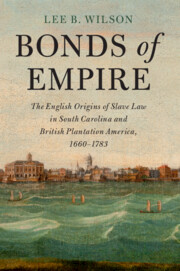 Bonds of Empire
Bonds of Empire Published online by Cambridge University Press: 02 July 2021
In Chapter Four, I watch as South Carolina colonists adapted another, much older set of legal categories and procedures, transforming their local Chancery Court into a slave court. Analyzing unstudied manuscript litigation records reveals that colonists routinely asked Chancellors to recognize property interests in people and to facilitate the transfer of familial wealth in the form of slaves. In doing so, they relied upon procedures common to English equity courts, and they invoked familiar descriptions of equity as a concept. Whereas at common law complainants were constrained by traditional forms of action, Chancery procedures gave South Carolina colonists an opportunity to claim enslaved people when evidence had been destroyed, when relatives conspired to conceal slaves, or when witnesses could not be located. Using the relative openness of Chancery bill procedure to tell their complicated stories, they asked the Court to intervene and adjudicate the space between the customary and legal. In doing so, they lay bare the dense web of arrangements and assumptions involving human property that made their plantation economy work, and the Court’s role in perpetuating those arrangements. In a place where peopled were deemed objects at law, equity – a law rooted in notions of justice and fairness – ironically opened up space for litigants to articulate claims to human beings.
To save this book to your Kindle, first ensure [email protected] is added to your Approved Personal Document E-mail List under your Personal Document Settings on the Manage Your Content and Devices page of your Amazon account. Then enter the ‘name’ part of your Kindle email address below. Find out more about saving to your Kindle.
Note you can select to save to either the @free.kindle.com or @kindle.com variations. ‘@free.kindle.com’ emails are free but can only be saved to your device when it is connected to wi-fi. ‘@kindle.com’ emails can be delivered even when you are not connected to wi-fi, but note that service fees apply.
Find out more about the Kindle Personal Document Service.
To save content items to your account, please confirm that you agree to abide by our usage policies. If this is the first time you use this feature, you will be asked to authorise Cambridge Core to connect with your account. Find out more about saving content to Dropbox.
To save content items to your account, please confirm that you agree to abide by our usage policies. If this is the first time you use this feature, you will be asked to authorise Cambridge Core to connect with your account. Find out more about saving content to Google Drive.